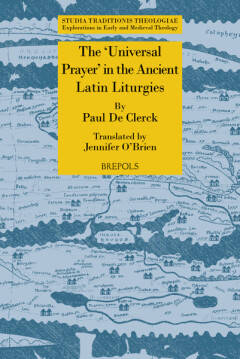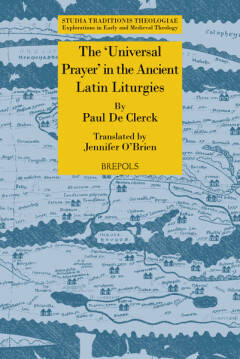
Bedankt voor het vertrouwen het afgelopen jaar! Om jou te bedanken bieden we GRATIS verzending (in België) aan op alles gedurende de hele maand januari.
- Afhalen na 1 uur in een winkel met voorraad
- In januari gratis thuislevering in België
- Ruim aanbod met 7 miljoen producten
Bedankt voor het vertrouwen het afgelopen jaar! Om jou te bedanken bieden we GRATIS verzending (in België) aan op alles gedurende de hele maand januari.
- Afhalen na 1 uur in een winkel met voorraad
- In januari gratis thuislevering in België
- Ruim aanbod met 7 miljoen producten
Zoeken
The 'Universal Prayer' in the Ancient Latin Liturgies
Patristic Evidence and Liturgical Texts
Paul De Clerck
Paperback | Frans
€ 84,80
+ 169 punten
Omschrijving
The reinstatement of the Universal Prayer into the Roman liturgy following the Second Vatican Council prompted Paul de Clerck to research its origins and development, taking as his primary model the ancient Roman Orationes sollemnes of Good Friday. The result has been a marvellous gift to liturgical scholars, as his meticulous study of texts from both East and West brings to light direct and indirect relationships and provides significant insight into the way in which Western liturgical families developed their intercessory formularies. The first part of his study is devoted to analysis of allusions to the Oratio fidelium found in the writings of the Fathers and ecclesiastical writers of the first five centuries, with the aim of discovering the prehistory of the 'prayer of the faithful' particularly with regard to its content, form and placement within the liturgy. The second part of the study analyses and compares the oldest preserved texts that shed light on the prayer. Chief among these are the Deprecatio Gelasii in its various iterations, the Orationes sollemnes of Rome (and parallels in other Churches) and the Gallic and Hispanic Orationes paschales, together with relevant texts from Celtic and Gallican sources. The translation of the French text will provide English-speaking scholars across the globe access to this excellent work and encourage similar in-depth research into liturgical sources that will continue to enhance the celebration of the Church's liturgy and the full and conscious participation of the entire faithful.
Specificaties
Betrokkenen
- Auteur(s):
- Uitgeverij:
Inhoud
- Aantal bladzijden:
- 393
- Taal:
- Frans
Eigenschappen
- Productcode (EAN):
- 9782503606811
- Verschijningsdatum:
- 26/06/2024
- Uitvoering:
- Paperback
- Formaat:
- Trade paperback (VS)
- Gewicht:
- 1469 g

Alleen bij Standaard Boekhandel
+ 169 punten op je klantenkaart van Standaard Boekhandel
Beoordelingen
We publiceren alleen reviews die voldoen aan de voorwaarden voor reviews. Bekijk onze voorwaarden voor reviews.









